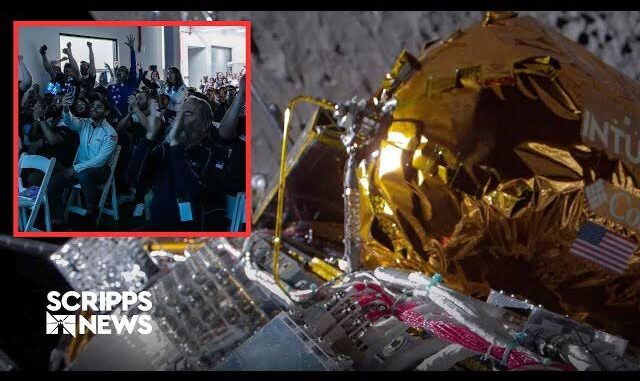
Private Intuitive Machines moon lander declared dead after falling on its side in crater at the lunar south pole.
In a significant setback for lunar exploration, the private Intuitive Machines lunar lander, known as “Nova-C,” has been declared dead after it succumbed to a catastrophic failure upon landing on the Moon’s desolate surface. The lander, part of a pioneering mission aimed at studying the lunar south pole region, fell on its side in a crater shortly after touchdown, rendering it inoperable. This unfortunate turn of events not only marks a disappointing chapter for Intuitive Machines but also poses questions about the challenges of conducting operations in the notoriously rugged terrain of the Moon.
The mission, which had been highly anticipated as part of NASA’s Commercial Lunar Payload Services (CLPS) program, aimed to deliver scientific instruments and technology demonstrations to enhance our understanding of lunar resources. The lunar south pole is particularly significant due to its potential water ice deposits, which could be crucial for future manned missions and sustained lunar habitation. The data gathered from this region is expected to inform our approach to long-term space exploration, making the failure of the Nova-C lander all the more disheartening.
Upon its landing, initial telemetry data suggested that the lander had successfully reached the surface; however, subsequent communication indicated that it had tipped over. Engineers at Intuitive Machines and NASA speculated that unexpected topographical features—such as steep slopes or hidden boulders—could have contributed to the lander’s instability during touchdown. Indeed, the south pole is characterized by its unique and complex geological features, where the interplay of craters and ridges presents challenges even for the best-laid plans.
The Intuitive Machines team expressed deep disappointment at the loss but emphasized the mission’s role in paving the way for future lunar exploration. NASA Administrator Bill Nelson commended the company’s ambitious endeavors, highlighting that setbacks are an inherent part of space exploration. “Each mission we undertake provides invaluable lessons that fuel the progress of our understanding and capabilities in space,” he remarked, emphasizing resilience in the face of challenges.
The failure of the Nova-C lander also underscores the critical nature of risk management in the private aerospace sector, where companies like Intuitive Machines are stepping up to meet the growing demand for lunar exploration and commercial opportunities in space. The competition is fierce, with several companies vying to stake their claim in the emerging extraterrestrial economy. While this mission ended in disappointment, it also fosters a culture of innovation and determination, reinforcing the need for thorough testing and validation of technology before embarking on lunar endeavors.
Despite the immediate failure, the potential gains from missions to the Moon’s south pole remain immense. Future missions, whether conducted by Intuitive Machines or other aerospace companies, will undoubtedly build upon the lessons learned from the mishap of the Nova-C lander. As the space exploration landscape evolves, the collaboration between public institutions like NASA and private enterprises will continue to push the boundaries of what is possible.
In conclusion, while the lifeless Nova-C lander serves as a reminder of the difficulties inherent in space missions, it also symbolizes humanity’s relentless pursuit of knowledge and exploration. As teams regroup and refocus their efforts, the dream of uncovering the mysteries of the Moon’s south pole continues to shine bright, inspiring future generations of explorers and scientists committed to advancing our presence beyond Earth.
Leave a Reply